I’ve never been that keen on John Wayne doing ‘funny’. To me, he’s just not cut out to be either a clown or the butt of someone else’s joke but Duke obviously didn’t mind, seeing as he appeared in a handful of films in which the script was not geared totally towards the dramatic.
John Wayne’s Romantic Comedies
On that basis, I’ve re-evaluated some of the films that I feel fall into the category of comedy, romantic or otherwise, although some of you might find that questionable as regards one or two of the movies in this article.
As usual, I’m going to rate them in terms of preference, with the most comedic of the list in pole position at the end.
Jet Pilot (1957)
This one comes first at the bottom of my list seeing as it’s not exactly Duke’s finest hour, or one hour fifty-three minutes if you want to be pedantic.
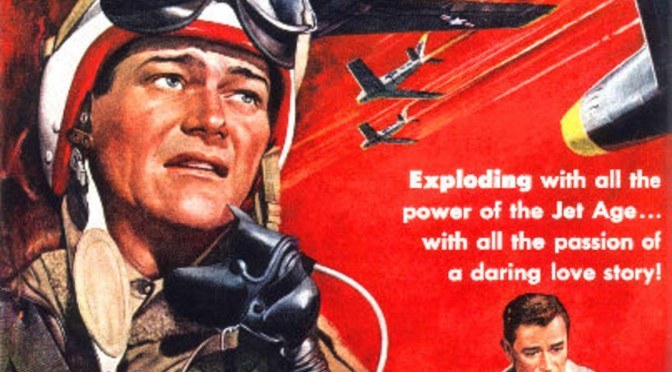
Directed by German filmmaker Joseph von Sternberg, a director not exactly known for his comedy films, it took nearly four years from 1949 to 1953 before principal shooting was finished.
Producer Howard Hughes then held on to it for another four years whilst he continued playing around with the negative before it was eventually released in 1957. An American propaganda film in all but name only, the anti-Russian sentiment was almost out-of-date by the time it belatedly hit the screen.
The story concerns the unlikely romance between Wayne as Air Force Colonel Jim Shannon and female pilot Soviet defector Anna Marladovnar, played by Janet Leigh.
Like most Howard Hughes films the centre of gravity for this movie is the size of cleavage displayed by the female lead, and Leigh plus cleavage dutifully oblige. When Anna first appears, the whistling of the jets in the background increase exponentially as she climbs out of her plane. Funny, huh?
The whistling ramps up even more in a later scene when Anna starts to disrobe in front of a bemused JW, so subtlety is not the name of the game here.
To be fair it’s not supposed to be an out-and-out comedy but, if truth be told, Duke is more of a man of action, so he needs to punch out a few lights a couple of times every reel.
Unfortunately, it’s Janet Leigh instead who gets to whack JW around the head with the butt of a gun when it turns out Anna is actually a double agent. In the words of the man himself, she was ‘a Soviet Tootsie roll who made a chump out of me’.
There’s an interesting feminist slant to the plot whereby Anna has to prove her flying chops as a woman.
It’s also intriguing to see Janet Leigh sporting a Princess Leia hairstyle 20 years or so before “Star Wars”, proving yet again there’s no such thing as an original idea when it comes to the world of film. In the end, capitalism triumphs over Communism, but then we all knew it would even before the film began.
North to Alaska (1960)
Directed by Henry Hathaway, this was definitely supposed to be a comedy film, seeing as Duke found himself in the company of Ernie Kovacs, who at the time of production was a highly popular TV comedian in America.
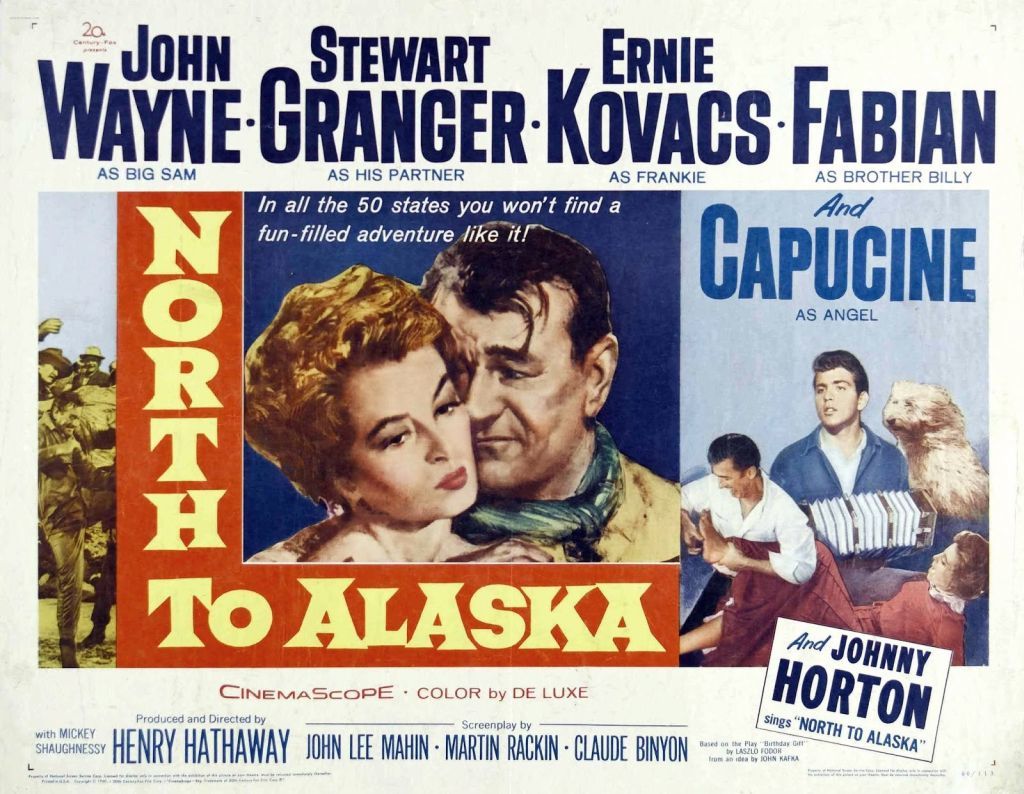
Now I know the film has its admirers when it comes to the majority of JW fans out there but I’m afraid it didn’t connect with my funny bone, not even when someone punched Wayne and he pulled an amusing face to indicate to the audience that they’re supposed to be watching a comedy.
Actually, I lie. I did find myself tickled by the idea that Duke as miner Sam McCord could, at the age of fifty-three, win a tree-climbing contest without collapsing from a coronary.
On the plus side, the film does feature the presence of the beautiful French actress Capucine, one of Duke’s more impressive looking co-stars, although she’s only really required to look lovely and take the occasional bath whilst JW and Stewart Granger as his partner George Pratt hit everyone in sight.
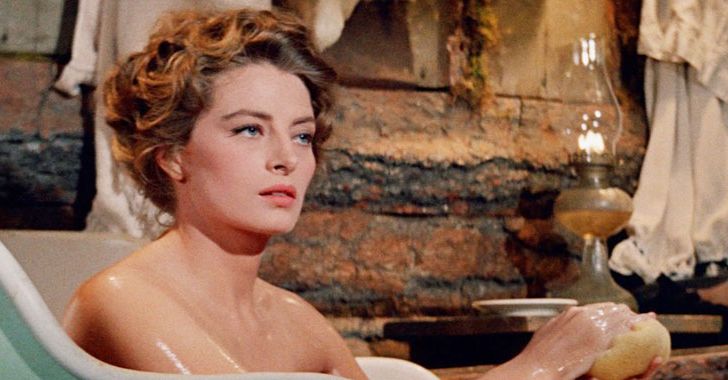
A mention in dispatches should go to Fabian’s quiff which seems to have been cemented to the front of his head, stubbornly maintaining its shape despite numerous punches to the singers face whilst rolling around in the mud.
Fabian was the only one to walk away with an award after his appearance in “North to Alaska”, albeit one from Harvard Lampoon for least promising actor of 1960. And I still maintain it is not that funny.
A pretty good theme tune though.
Without Reservations (1946)
I believe this is the only John Wayne film comedian Jack Benny ever appeared in. It’s a cameo role but Benny’s fleeting presence indicates we’re supposed to be looking at a comedy.
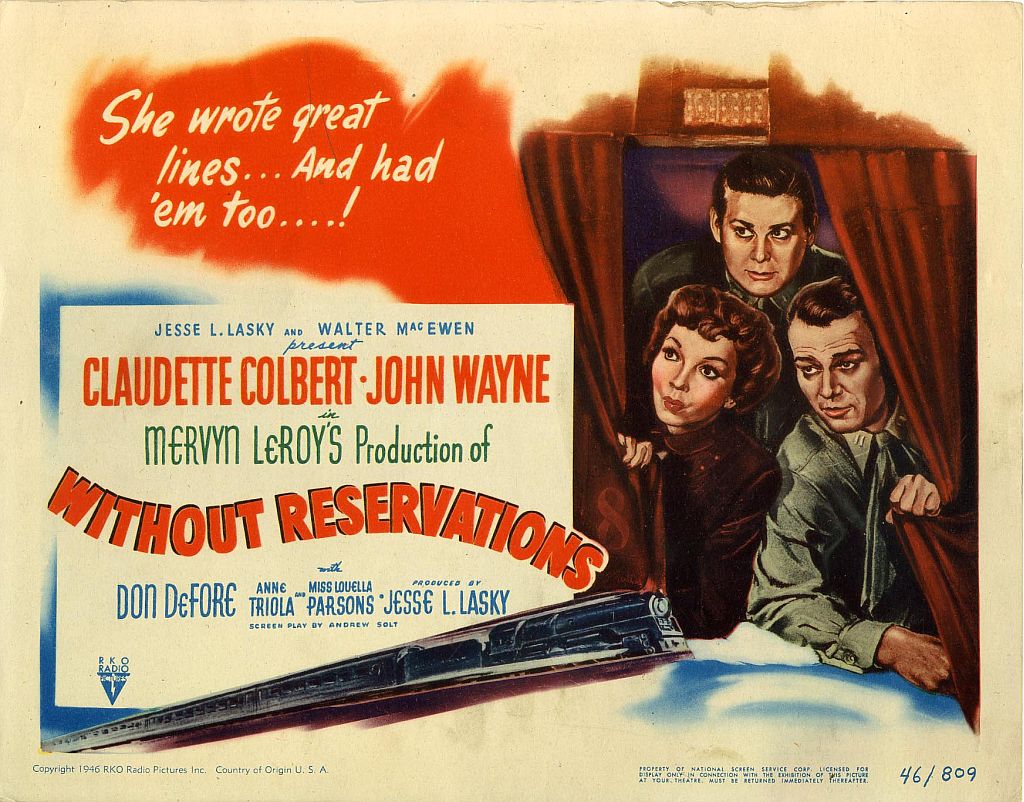
In a story that bears more than a passing resemblance to certain aspects of “A Lady Takes Chance” (more of which later), the female protagonist, an authoress strangely referred to as Christopher Madden and played by Claudette Colbert, has written a book called “Here is Tomorrow”.
The book has been optioned by Hollywood, hence Benny’s cameo along with that of Cary Grant. The writer meets up with Wayne, playing a Marine called Rusty Thomas, who is home from the war and on his way to San Diego with trusty sidekick Dink Watson, played by Don DeFore.
Colbert keeps her real identity from Wayne whilst trying to trick him to go to Hollywood and test for the male lead in the film version of her book after Cary Grant has passed on the role.
The only time I came anywhere near chuckling was at the end when Wayne realises Colbert and her film producer want to make an actor out of him. ‘An actor?’, he shouts, in a manner that suggests that’s the last thing he’d ever try being. That’s right, Duke. I mean, why break the habit of a lifetime – just kiddin’.
The problem with this ‘comedy’ is that it’s just not as funny as it could have been. I found it a bit too overly jingoistic, the script peppered with dialogue such as ‘People should appreciate their country’, but then I guess that’s literally a sign of the times.
It also smacks at times of the notion of men coming home from war then trying to put women back in their place, which I’d say was rather an outmoded line of thinking even at the time the film was made.
Finally, I wasn’t really convinced that Wayne and Colbert are a credible romantic couple. Maybe it’s just me but, although Colbert was only four years older than Wayne, there are times when she looks more like his mother than his love interest.
Trouble Along the Way (1953)
This is more like it.
Co-written by Melville Shavelson who worked for Bob Hope and wrote the script for a number of his films, “Trouble Along the Way” is an innocuous piece of heart-warming fluff, helmed by Warner’s in-house director Michael Curtiz.
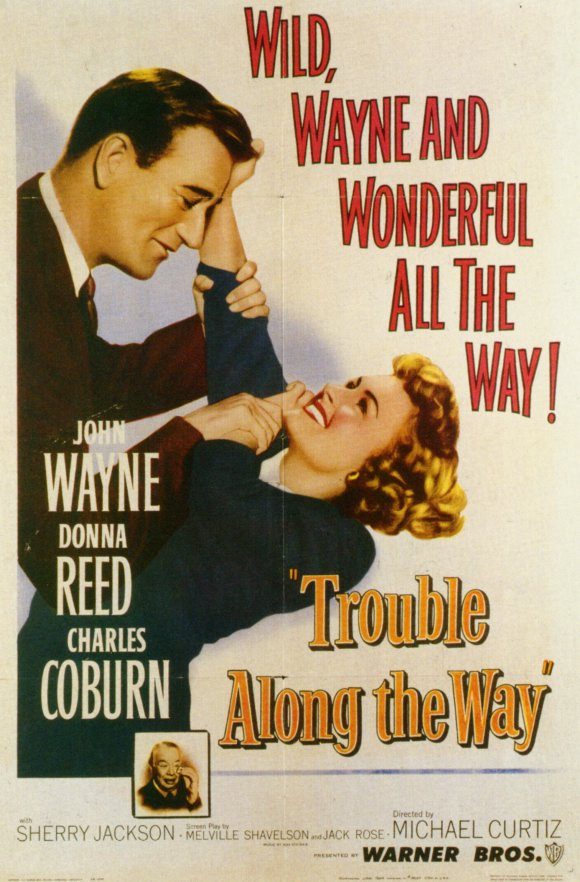
Duke plays Steve Williams, a wise-ass former football coach and single father to a wise-ass 11-year-old daughter called Carole, played by Sherry Jackson. We know she’s sassy because Carole calls daddy by his first name.
He’s approached to help revive the fortunes of a college football team by the head of the institution who wants JW to help build the players up whilst at the same time he, JW that is, tries to gain custody of his daughter after divorcing his ex-wife, played by Marie Windsor.
Into the mix walks Wayne’s co-star from “They Were Expendable”, Donna Reed, as a social worker inclined to initially favour the idea of handing custody to Windsor over JW.
The screenplay is quite amusing at times, although not exactly laugh out loud material. Ten out of ten though, to whoever managed to get the line ‘Drop over tonight, Steve, I’ve got some money in my sugar bowl for you’ past the Hays Code.
The Fighting Kentuckian (1949)
In this film John Wayne and Oliver Hardy (the larger of the Laurel and Hardy comedy duo), appear together for the first and last time on the big screen, although the pair had worked with each other a few years before in a charity production of the play “What Price Glory?”.
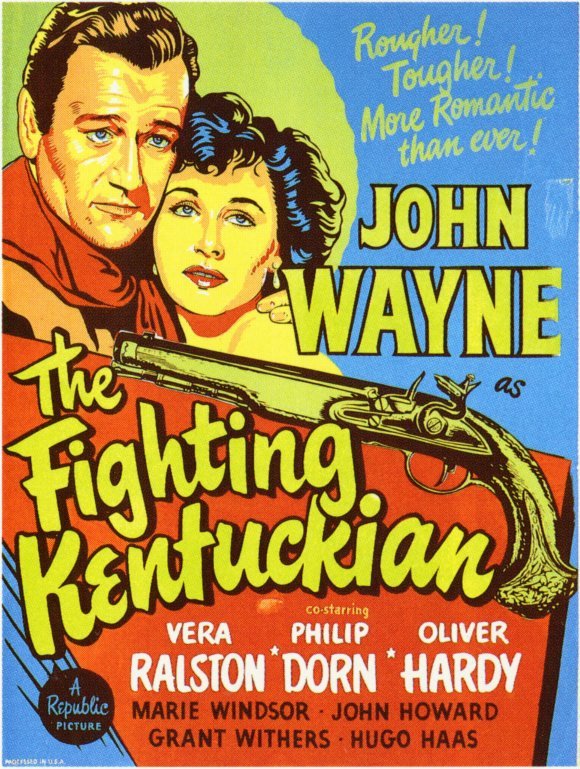
I’m tempted to quote the old line ‘that’s another fine mess you’ve got me into, Mr. Wayne’, but it’s relatively entertaining, if not a JW classic.
Olly doesn’t really do much other than play his famous screen incarnation whilst dressed in fringe leather frontier getup and a beaver hat whilst Wayne seems to be wearing the same duds he had on in “Allegheny Uprising”, still apparently auditioning for the part of Davy Crockett.
The story revolves around a ‘little known episode in American history’, in which a bunch of French exiles faithful to Napoleon settle in America in the 1840s.
Wayne and his fellow Kentuckian militia wander through on their way to – actually I don’t know where they’re off to – but Duke, playing a character by the name of John Breen, ends up scoring with Vera Walston after only seven minutes into the picture which I think is a record even for him.
Mind you, she does look particularly ravishing, which is probably why Republic studio head Herbert Yates left his wife and kids for her, and that French accent sure helps things along, Vera, in turn, falling head over heels with “Shonbreen” as she calls him.
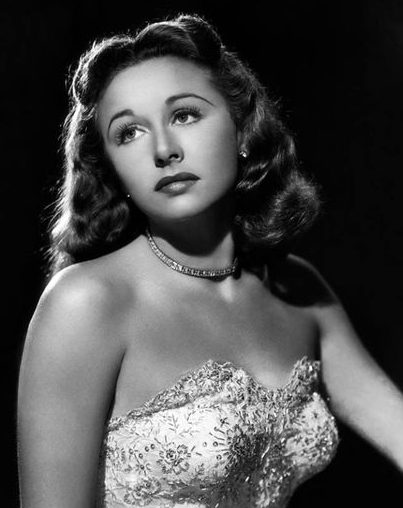
Wayne and Hardy sing a marching song together which is something I never thought would be captured on celluloid.
Another unique aspect of the film is the sequence in which Wayne converses with himself, his alter ego addressing him as a voiceover. Weird.
At some point in the proceedings, he and Hardy end up posing as land surveyors so cue Hardy stumbling around, falling into the water – twice – and other moments of hilarity to justify his presence in the movie.
The inevitable clash between the good guys and the bad guys takes place, good triumphs over bad and Wayne ends up getting hitched to the lovely Vera.
Just as the happy couple are about to ride away Wayne and Hardy exchange a friendly wink, Wayne then asking his new bride, ’We can’t take him on honeymoon with us, can we?’ I’m assuming the question was rhetorical. At least I’m hoping it was.
John Wayne Romantic Comedies Part 2
Start placing your bets as to which classic John Wayne film makes its way to the top of this particular list.
A Lady Takes a Chance (1943)
You can tell just by the opening music and the declaration of ‘Once upon a time’ on a title card that we’re in romantic comedy territory with this one. To be more specific we’re in Cowboy and the Lady territory, only instead of Gary Cooper and Merle Oberon, we get JW and Jean Arthur.
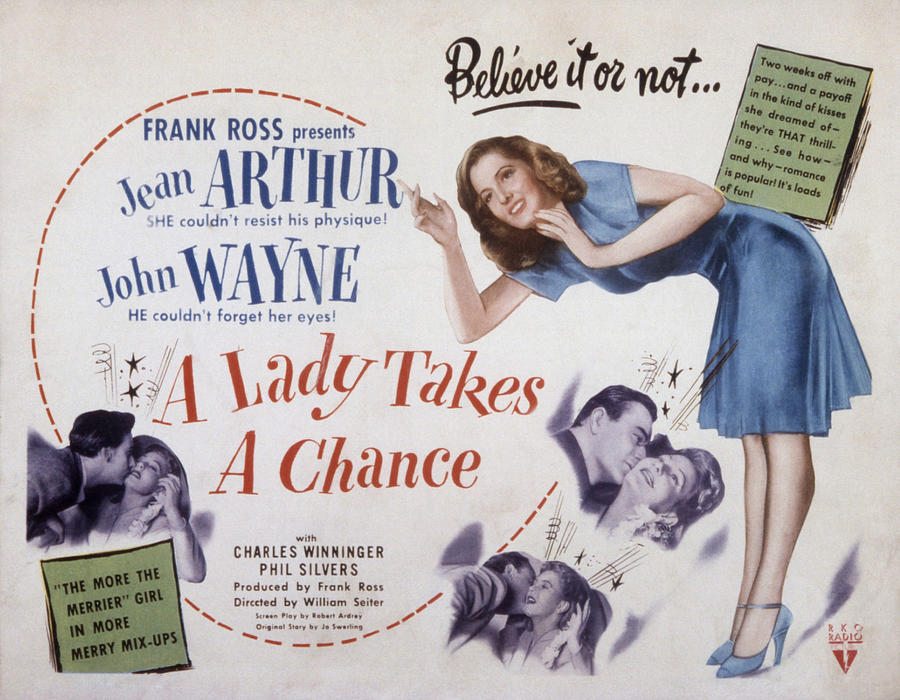
Duke plays a rodeo rider called – who else? – Duke. Jean Arthur as Mollie decides to take a bus trip out West to get a flavour of the place, as young women back in the 1940s were wont to do, and immediately falls for the first cowboy to be thrown from a horse and land in her lap. Guess who that cowboy is.
The film gets off to a lively start with Phil Silvers in early Bilko mode as a bus driver but it’s no more than a cameo, which is a shame. A bit more Silvers and this film could have been genuinely funny. Although I have to admit the sight of Wayne wearing a kitchen apron is slightly amusing.
Mollie is a bit of an airhead which is par for the course in a romantic comedy, what with having an imaginary horse called Gwendoline with ‘eyes as big as hamburgers’.
Jean Arthur gives it a touch of the Frank Capra school of screwball comedy which is highly appropriate seeing as she made three films with the director back in the 1930s; check out the blatant steal from “It Happened One Night”, revealing her legs in true Claudia Colbert fashion to hitch a ride.
The whole ‘will they won’t they?’ rom-com thing includes Molly taking the blanket from Duke’s horse and the horse ending up with pneumonia so it’s a bit of a lightweight affair with hardly any cowboy action to speak of, but that’s cowboy fish-out-of-water romantic comedies for you.
A proper genuine JW comedy film.
Donovan’s Reef (1963)
The final film in which JW and John Ford worked together, Wayne, as Michael Patrick “Guns” Donovan, and fellow Navy veteran “Boats” Gilhooley, played Lee Marvin, honour a long-held tradition of meeting up each year in French Polynesia to kick the stuffing out of each other on the occasion of their shared birthday.
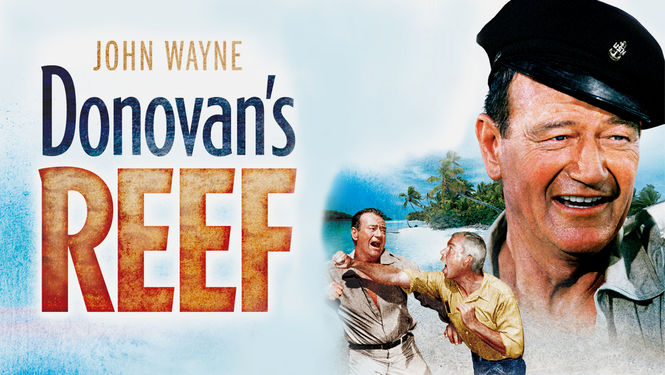
And why not? It’s as good a reason as anything else. Into the mix arrives stuffed shirt Amelia Dedham, played by Elizabeth Allen, daughter of Doc Dedham, another veteran acquaintance of Guns and Boats.
Amelia and Doc, played by Jack Warden, have never actually been introduced and she arrives to see whether daddy is legally entitled to keep a large amount of money due to him despite having fathered a few more Dedham’s over the years.
It’s not the kind of film one might stumble across today in light of the #MeToo movement seeing as Wayne is twenty-two years older than his love interest, Elizabeth Allen.
On the other hand, Dorothy Lamour, who plays Lee Marvin’s on-off girlfriend, was at least ten years older than Marvin at the time so the film should be applauded for being an exercise in equal opportunity when it comes to inappropriately aged older partners.
The initial fight between JW and Marvin is quite entertaining and funny in a slapstick way and there’s one laugh-out-loud moment when Elizabeth Allen sits in the back of a jeep as it races down the road.
The jeep hits a bump which sends her up in the air whilst the vehicle continues on its way, unceremoniously dumping her – or more accurately her stand-in – on her backside in the middle of the street.
There’s also an amusing reference to contemporary culture in which a group of small children break out into an impromptu demonstration of the twist dance craze of the time, which was unexpected, to say the least seeing as this is a John Ford film.
Could have done with more fisticuffs between Wayne and Marvin, and less soppy romance.
Hatari! (1962)
Although on the surface a romantic comedy drama concerning a group of wild-life hunters who capture animals for the zoo, it’s really just another opportunity for director Howard Hawks to yet again explore the dynamics of a group of alpha males, with one or two women thrown in for good measure.
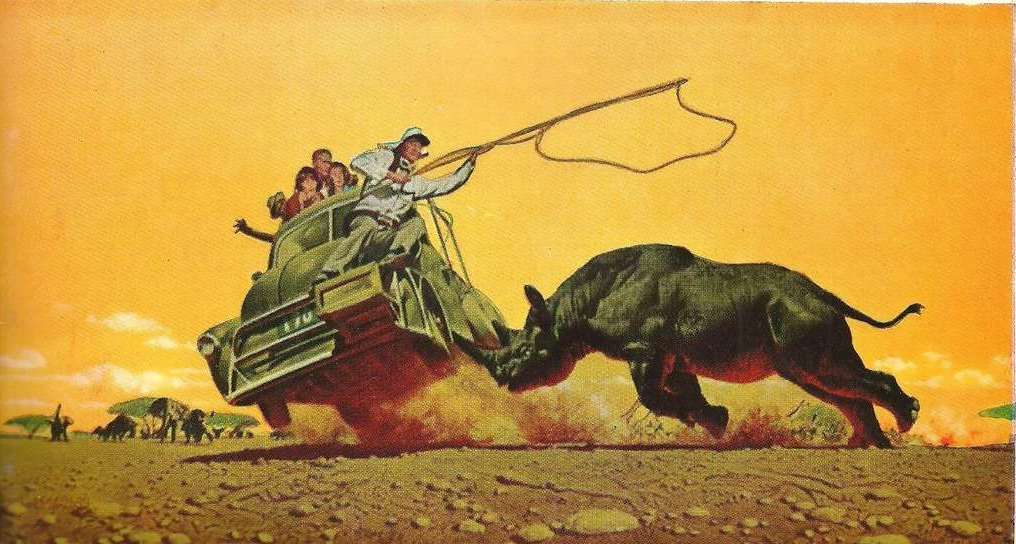
Most of the comedy is supplied by Red Buttons as Pockets, mainly in the scene where he helps to capture a gaggle of monkeys in a tree with the aid of a rocket propelled net. Yep, it’s another Hawks movie in which the main characters all sport nicknames such as Chips, Brandy and The Indian.
Into this near all-male enclave saunters wild-life photographer Anna Maria D’Allesandro, hitherto known as Dallas, played by the delightful Elsa Martinelli.
Romantic misunderstandings become the order of the day with JW as boss Sean Mercer avoiding falling in love with Dallas due to having had his heart previously broken by an ex-girlfriend.
Love wins out in the end though, Sean eventually wooing Dallas by using a group of baby elephants to prevent her leaving. Cue the cute Henry Mancini tune baby “Elephant Walk – Mancini also wrote lyrics for the song which you can find on the internet if you’re interested.
Hawks throws in a couple of musical numbers for good measure, with Buttons on harmonica and Martinelli appearing to be playing boogie woogie piano for real. A couple of dance sequences also get thrown into the mix to show how hep to the scene these groovy cats are.
On the whole you’re left with the impression that everyone involved had a good time making the film, and that feeling transfers to the screen, which isn’t a bad thing really.
By the way, did you know Hatari is Swahili for danger? No, I didn’t either.
McLintock! (1963)
How can you not like a film which opens with John Wayne threatening “Don’t say this is a fine morning or I’ll shoot ya!”?
It means right from the get-go you know you’re definitely in rollicking Western land with a side dish of slapstick, and as rollicking slapstick Westerns go this is probably one of the best.
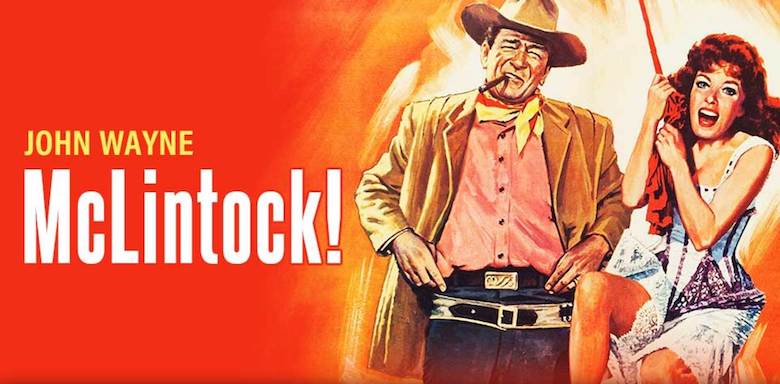
The first of six movies Wayne starred in for director Andrew V.McLaglen, it reunites Duke with Maureen O’ Hara for the first time since “The Wings of Eagles”, his popular co-star once more playing the role of the estranged wife.
The film is very loosely based on “The Taming of the Shrew”, with O’Hara’s character sharing the same name as that of Katharine, the “shrew” of the title in Shakespeare’s play.
Duke is at his most glorious best in the title role, his performance epitomising the high, wide and handsome persona he had carefully cultivated over the years.
Back in the day it would have been the kind of movie critics would have dubbed an “entertaining romp”, and it most certainly is, even though for a Western the action is sparse on the ground. Wayne only fires three shots in the film, two at a couple of pheasants and a blank shot at Patrick Wayne.
If the film is remembered for anything at all it’s for the iconic scene in which Wayne informs Leo Gordon, who fatally pushes the big man just a little bit too far, that somebody “should belt you in the mouth, but I won’t – the hell I won’t” before proceeding to do just that.
The fact that this takes place at the top of a mud pit tells you all you need to know about the comedic nature of the film and, yes, everyone ends up getting knocked headlong into it.
The sexual politics of the film is not going to gain too many brownie points from feminists and the politically correct brigade of today, what with Duke deciding the only way to win his estranged wife back is by spanking her on the behind.
The climactic encounter between Wayne and O’Hara is rather reminiscent of the end of “The Quiet Man”, the film striving maybe a little too hard to duplicate the success of their earlier film together, but all in all it was probably deemed all clean fun back in the less enlightened early 1960s.
The Quiet Man (1952)
Probably the second most popular cinematic outing for the Wayne / John Ford partnership, “The Quiet Man” had been a cherished project of John Ford for a long time but the only way he could get the financing off the ground was to make a Western for Republic studio head Herbert Yates.
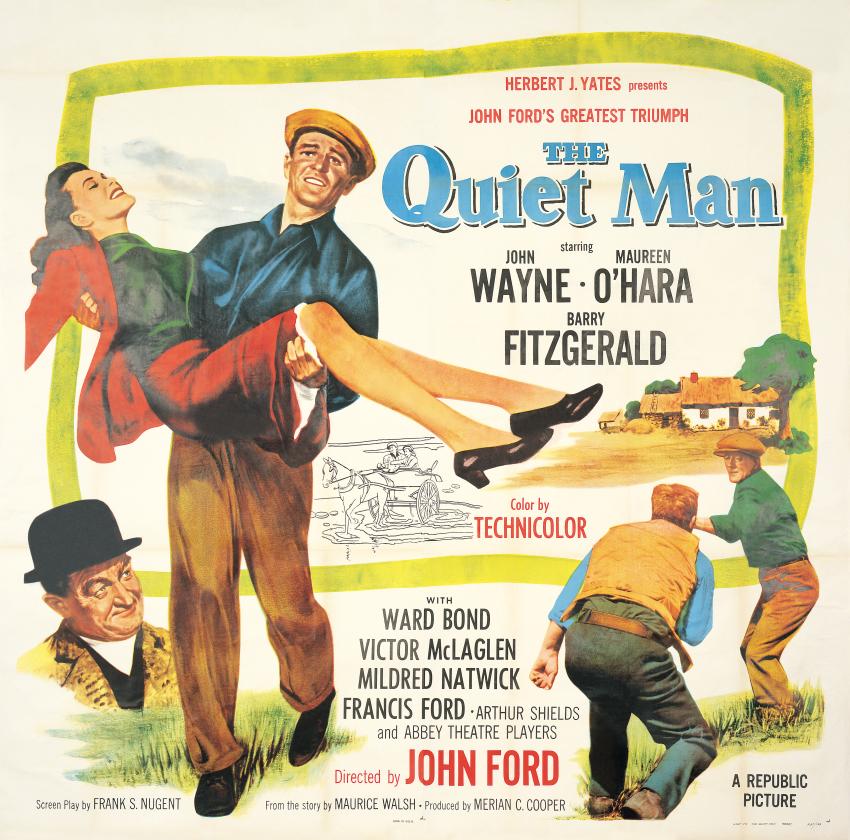
Ford delivered “Rio Grande”, pairing Wayne with Maureen O’Hara for the first time, and Yates delivered the money.
The film is very loosely based around a series of short stories written by Irish author Maurice Walsh and published together in a book originally called The Green Rushes.
From this material, Ford and scriptwriter Frank Nugent forged the screen story of “The Quiet Man”.
I’m not going to recount the story of the film here as I’m assuming you’ll know the movie backwards, particularly if you’re a Ford or Wayne fan.
Suffice to say that Duke acquits himself well, successfully capturing the angst of an ex-boxer who has accidentally killed a man in the ring back in America, and just happy to live a quiet life as a quiet man in the country of his birth.
The highlights are numerous, in particular the much-anticipated fist fight between Wayne and Victor ‘Red Will’ McLaglen at the climax of the film.
In terms of humour there is much to savour, most of it deftly handled through the wonderful performance of Barry Fitzgerald as Michaleen Oge Flynn, the village matchmaker and professional drunk.
His efforts to make a shilling or two out of the fight between Thornton and Danaher are the most effective.
He also gets to utter one of the best lines in the film where, upon noticing the broken bed that he mistakenly assumes is the result of a tryst between Thornton and his new wife Mary Kate, utters the words “Impetuous! Homeric!”.
Fitzgerald savours other lines of dialogue such as “Well it’s a nice, soft night, so I think I’ll go and join me comrades and talk a little treasure” with equal measure.
The humour aside, “The Quiet Man” is the closest that Ford ever came to making a full-blown musical, an Irish Brigadoon if you like.
Everyone in the film seems to want to exercise their tonsils at the drop of a hat, with renditions of classic Irish evergreens such as ‘The Wild Colonial Boy’, ‘Galway Bay’ and ‘The Humour is on Me Now’ scattered throughout the movie.
The film itself is a Hollywood depiction of Ireland that’s so ‘Oirish’ you half expect to see a leprechaun emerge from behind the scenery at any given moment – then Barry Fitzgerald appears and if he isn’t a leprechaun in spirit as well as demeanour I’ll eat my green St. Patrick’s Guinness hat.
Feel free to suggest other contenders for John Wayne’s comedic screen outings that you think might deserve inclusion in this article on the best romantic comedies of John Wayne.
You might also like our look at the top quotes of John Wayne or maybe the quotes of Clint Eastwood
Or another popular article on the movies in which John Wayne died in
More on John Wayne’s leading ladies and even more

The author of this article obviously lacks a humor bone… John Wayne made THREE comedy features…
• North to Alaska #1…
• Donavons Reef #2…
• McClintock #3…
Simply research the writers backgrounds…
There were others that had humor mixed in, but they were not written by comedy writers… As to romantic features, they always include humor, but they are romance features, not comedies…
Note: Hatari is a action adventure with a touch of humor, but it is not a comedy…
Yeah, we weren’t going for “action adventure with a touch of humor” films. No, we were sticking to “romantic comedies”.